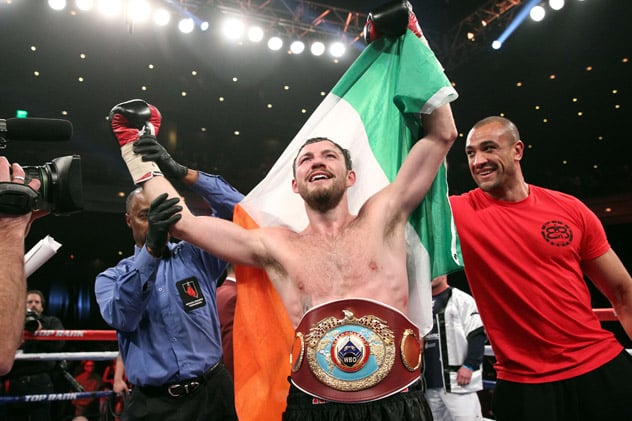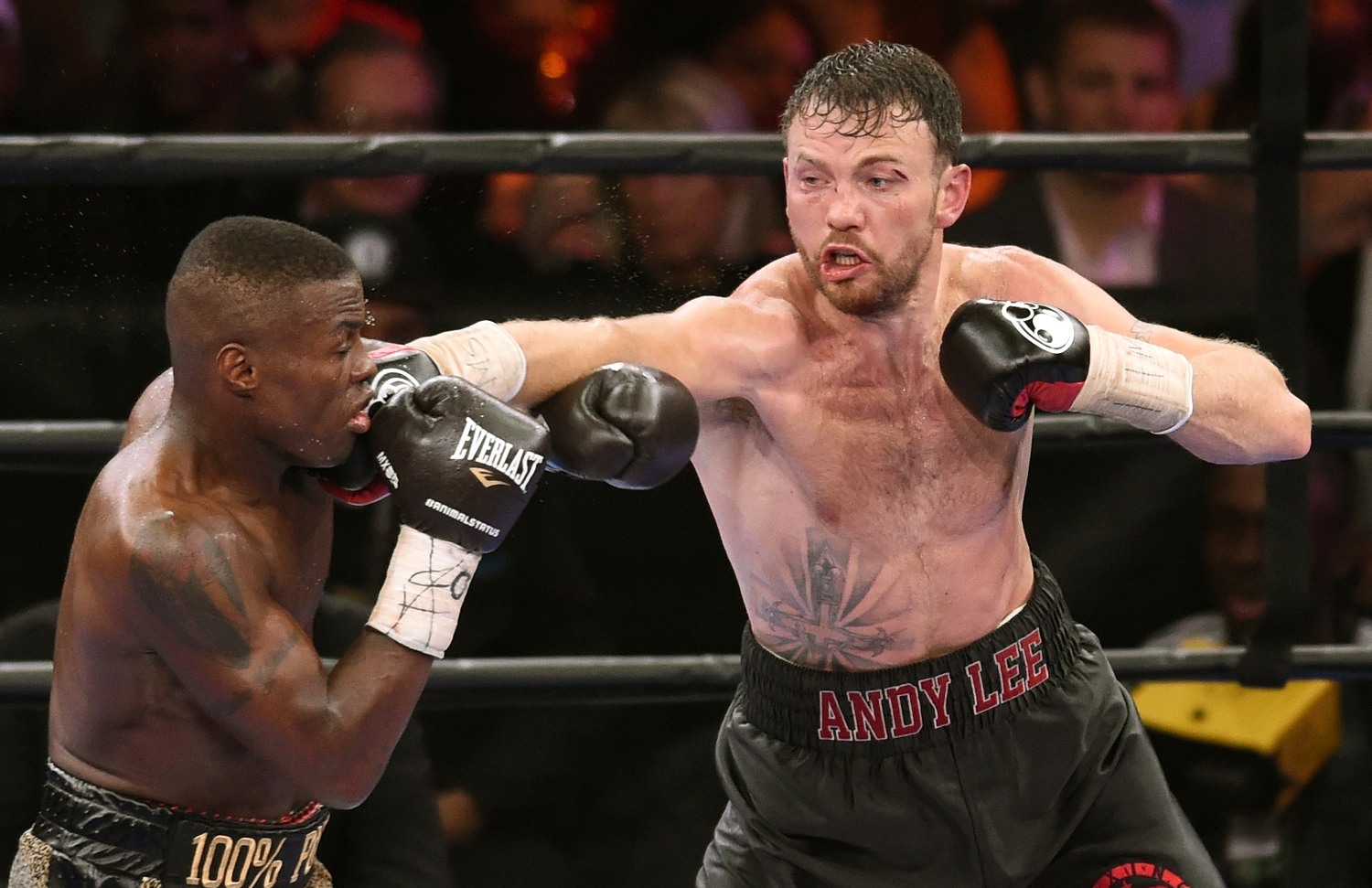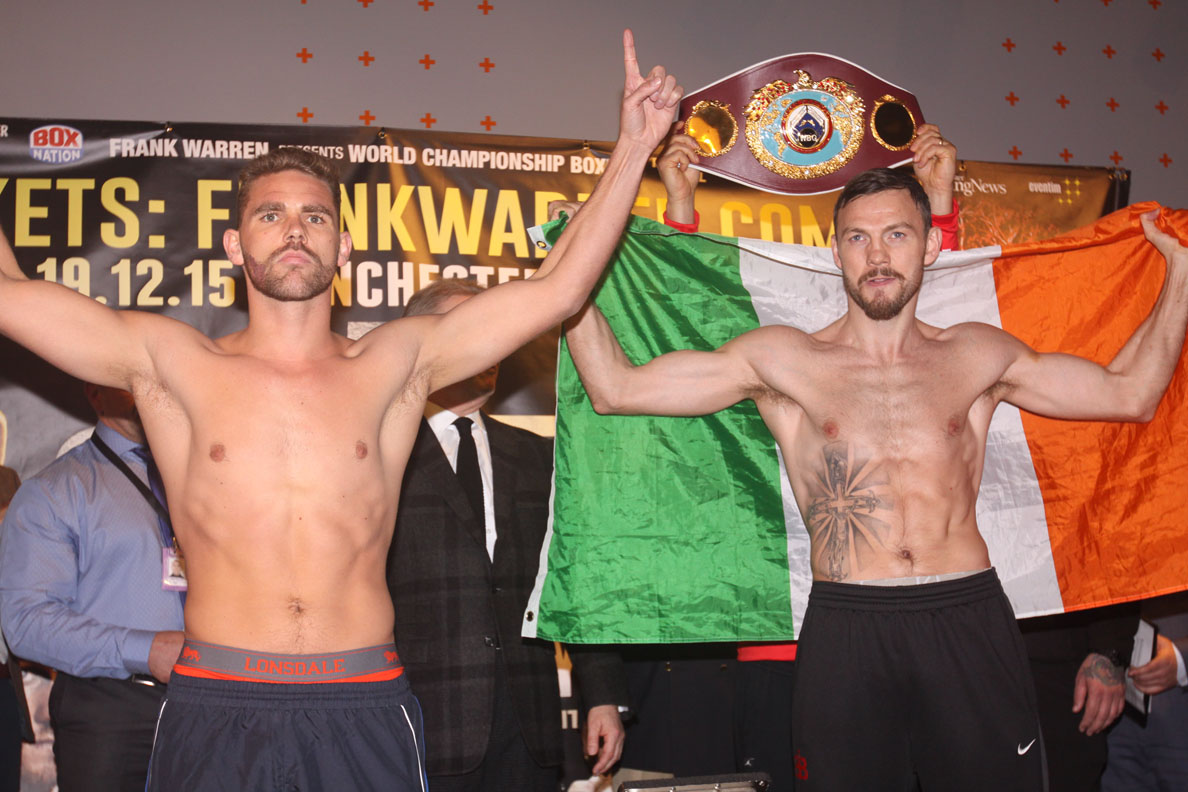Best I Faced – Andy Lee

Rangy boxer-puncher Andy Lee was a standout amateur, who was anointed as a future world champion from the very beginning of his professional career. Though he reached those heights, it was a difficult path.
Lee, who was the fourth child of six, was born into an Irish gypsy family in London, England on June 11, 1984.
“I wouldn’t say it was tough, it was a good childhood,” Lee told The Ring. “My mum and dad were hard workers, we never wanted for anything. I grew up in boxing, going to the gym. My dad would take my older brothers to the gym and I would go along and sit and watch as a child, waiting for my turn.
“We lived on a caravan site in Bow. My dad was a tree surgeon and landscaper. I went to school and when I left school at 13. I went to work with my dad.”
Lee boxed out of the well-known Repton boxing club and won two national titles before the family moved back to live in Limerick, Ireland.
“That was always the plan,” he explained. “They had moved to London in the 1970s when work and things weren’t that good in Ireland. They moved for work.
“When we moved to Ireland when I was 14, those years were formative years. I was still working with my dad. I could have continued on the travelling life path, most travelling boys are very good under age boxers but very few follow it through to senior level. I realized I loved boxing and was very good at it. I remember the day I made my decision to dedicate myself to boxing.”
It proved to be the correct one, Lee was a three-time Irish national champion and claimed silver at the World Youth championships in Cuba in 2002.
“I had beaten a guy called Jesus Gonzalez, who was sponsored by Emanuel Steward,” he recalled. “That’s where he first saw me. I had told him I was going to try to stay amateur and qualify for the Olympics.”

Andy Lee (right) lands a straight right on Peter Quillin (left) Photo by Naoki Fukuda
Lee lost to eventual gold medalist and future Hall of Famer Gennadiy Golovkin at the World Championships in Bangkok in 2003. He claimed bronze at the European Championships in 2004 and was the only representative on the Irish team at the 2004 Olympics.
“I had built it up and everything is going to be fine when I get to the Olympics,” he said. “Really, the Olympics is just like every other boxing tournament in the world.
“In my mind I put it on a pedestal and when I was there, I was quite disappointed with the whole thing. I fought Alfredo Angulo and in the second fight I fought Hassan N’dam and lost on the countback. It was a very close fight.”
After returning home, Lee was presented with a lucrative offer from the Irish Sports Council to stay amateur until after the 2008 Olympics.
“It was a nice offer to stay amateur,” he explained. “There was incentives, guaranteed funding, some education, college courses and sponsored cars, I think it was €80,000 Euros a year tax-free (A similar amount in Dollars.) It was a lot of money. It was the safer option. I could have stayed in that system and been quite comfortable but it’s Emanuel Steward, it’s the Kronk gym. When I went over there for a visit and trial run and knew that was where I needed to be.”
Lee, who had lost a handful of fights out of roughly 80 amateur fights, made his debut at the famed Joe Louis Arena, Detroit with a six-round unanimous decision over Anthony Cannon in March 2006.
“I lived with Emanuel the whole time I was there,” he said. “We spent a lot of time together. Back in those days, I’d go with him whenever he had HBO gigs which was nearly every weekend or every second weekend. I’d fly with him everywhere. By being with him you learn how to conduct yourself.”
Lee put what he learnt into practice notably scored a highlight reel knockout against the vastly more experienced former junior lightweight titlist Carl Daniels early in his career.
However, Lee’s world title precession was abruptly halted when he was stopped in seven-rounds by Brian Vera in March 2008.
“I was underprepared and overconfident and came unstuck against a tough, tough man,” he admitted. “It’s was a very, very hard loss to take, especially when I’d been touted so highly. You don’t realize how much a loss can set you back and how I had to fight and really prove myself to even get back to where I was.”
After some sole searching Lee returned and reeled off several wins, all the while craving a rematch with Vera.
“I was in the middle of my comeback; people could see it was a blip,” he said. “Then I was fighting on HBO on the undercard of Sergio Martinez-Sergei Dzindziruk and knocked out Craig McEwan in a barnstormer, in the last round after being behind on the cards.
“Then I rematched my only defeat which was the co-main event to Martinez-Darren Barker. I was the next one in line after fighting twice on [Martinez] undercards. That was all being touted for March the next year and then they slip [Matthew] Macklin in front of me and want me to fight [Peter] Quillin on the undercard again and Emanuel totally objected to it. Emanuel said, ‘Andy has had two hard fights on the undercards, sold out the arenas, he’s the ticket seller.’ Now they wanted to do it all again against Quillin, a dangerous fight, without getting a title shot.
“Emanuel took a stand. I think I turned down $80,000 to fight Quillin. I ended up fighting against Saul Duran and I think I got paid $2,500/ $3,000 for the fight. We took it a moral standpoint and what we felt was right. It was all part of the struggle from the first loss to Brian Vera, even when you think you’ve done what you needed to do this still happens.”
Lee challenged WBC middleweight titleholder Julio Cesar Chavez Jr. in El Paso, Texas in June 2012.
“I only got the fight with Chavez because Martin Murray couldn’t travel to the U.S. because he had a criminal record,” said Lee, who was stopped in seven-rounds.
“I don’t give him much credit for the win because all the things that proceeded the fight and also the lack of drug testing. I saw a guy, physically, mentally and even facially change throughout the fight because of whatever he had done. We were drug-tested an hour and a half before the fight. That was the only drugs test. I don’t even like mentioning his name because he’s a cheater and not a real fighter.”

Andy Lee (right) claims that Billy Joe Saunders (left) was one of the best men he ever faced
Lee was back in London, with his now wife, when he received a call from a mutual friend to inform him of Steward’s ailing health.
“I got on the plane the next day and went straight to the hospital and spent time with him there. Myself and him were airlifted to what I’ve learnt is a hospice in Chicago.
“Even though he never fully admitted this could be the end, I could tell things weren’t going well and things weren’t improving. I didn’t know what the issue was when I booked my flight. I said, ‘Emanuel my flights tomorrow but I’m going to change it and stay.’ But he said, ‘Andy don’t change your flight. Go on home and I’ll see you again.’ I said goodbye but I knew I’d never see him again.”
With a heavy heart, Lee decided to fight on after joining forces with Adam Booth in late 2012. The Irishman worked his way back and had signed to face old amateur rival Golovkin, who was the WBA 160-pound titlist. Unfortunately, the fight was canceled when the Kazakh’s father died in early 2014.
In the meantime he faced John Jackson, the son of former middleweight knockout artist, Julian. Jackson was outboxing Lee until out of nowhere Lee uncorked fight ending right hand that knocked out Jackson in the fifth-round.
An old music conflict aided Lee’s next move. Roc Nation, who were owned by Jay-Z, won a purse bid for WBO 160-pound titlist Peter Quillin’s next fight. However, Quillin was looked after by Al Haymon who previously managed Destiny’s Child and one of the members of the group was Beyoncé. Haymon told Quillin to vacate the title, which opened up a scenario where Lee could fight Matt Korobov to fill the vacancy in December 2014.
“Even though I was always behind, I felt like I was always gaining on him a little each round,” said Lee. “There was a little signs of worry creeping in. There was an exchange, I come out low with a hook and he went high. When I hurt him [in Round 6,] I knew I would never stop punching, I knew that was my chance. As I was letting the punches go, I remember thinking, ‘C’mon step in.’ The moment came and it was pure satisfaction, a life time of work and it made it all worthwhile.
“We went up to Adam’s room and had a cup of tea. There were some people who came over. I didn’t sleep. I text Wladimir Klitschko and said, ‘I finally got a belt after all these years.’ and he text back, ‘Congratulations.’
“When I fought Korobov, I think I made $69,000 after license fees etc. A very good friend had a bet on the fight and won more money than I did.”
His first defense was tabbed to come against Quillin. However, the former champion missed weight and they instead fought a non-title bout. Quillin threatened to score an early knockout out but Lee recovered from an early trip to the canvas to come on late and salvage a draw.
“I was very fortunate when I won the title PBC had just started and me and Quillin were the second show,” he said. “They were giving out good money. Quillin was my best purse.”
Lee found himself in a sticky situation when his cousin Tyson Fury challenged Ring, IBF, WBA and WBO heavyweight champion Wladimir Klitschko in November 2015.
“I purposely didn’t speak to either of them before the fight,” he explained. “I didn’t comment on the fight at the time because I was close to both men.”
Lee had brokered a deal for Billy Joe Saunders to step aside to allow him to face Quillin. After three postponements the two fought in Manchester in December 2015.
“He’s very deceptive,” he explained. “When I used to watch him, I thought, ‘I’ll get this guy.’ But when you’re in there he does a lot of things that are not very perceptible. He dropped me early in the fight and I could never claw it back. When I fought him and, on that night, he was exceptional. I can’t take it away from him, he beat me fair and square.”
Lee fought once more and decided the time was right to step away from boxing.
“My first baby was due in the June and I got the feeling, it’s been a long career, I’ve achieved everything I wanted to achieve and what am I doing it for?,” he said. “I was financially secure, to continue would have been selfish. My wife had been through enough. I need to take care of my wife and kid and not if something went wrong, they’d be taking care of me.”
Lee is still immersed in the sport. He works the corner of his cousin Tyson Fury, and is the head trainer of former heavyweight titleholder Joseph Parker and rising welterweight prospect Paddy Donovan. He also works as a commentator for DAZN.
Lee, now 38, is married, has three children and lives in Dublin.
He graciously took time to speak to The Ring about the best he fought in 10 key categories.
BEST JAB
Billy Joe Saunders: John Jackson had a great jab, Peter Quillin had a great jab but I think Billy Joe Saunders probably surprised me with his jab the most. He sat quite low with his legs and would jab quite high and I found it difficult to out jab him or jab with him.
BEST DEFENSE
Saunders: I wasn’t able to catch him with that one big shot. He was clever, he wouldn’t risk landing his own punch, he was quite safe and quite clever in how he boxed. Very smart boxer and when he knew he was in with a puncher, it made his defense even sharper.
BEST HANDSPEED
John Jackson: Maybe because it was at a lower weight, that fight was at 154, most of my career was at 160 but I’d gone down the weight to take that fight. He had speed and power.
BEST FOOTWORK
Saunders: Part of Saunders defense is his footwork. Chavez Jr. was quite liberal with his footwork. His footwork was pressure footwork and where he would try to maneuver and position to get you onto the ropes. I would say Saunders.
SMARTEST
Matt Korobov: Saunders was a very smart, very clever fighter. Chavez had a lot of tricks, Quillin was quite clever, we had to be patient because we were punching so hard. You look at the Russian and Eastern European’s who have come on since Korobov, you can see when they have that amateur schooling behind them, there’s no mistakes, everything they do there’s a reason and method for it. Korobov was outpointing me, I class myself as a boxer, and I didn’t let anyone outpoint me but he was outpointing me for six-rounds before I caught up with him.
STRONGEST
Peter Quillin: Chavez was strong but I would say Peter Quillin. The size of the man, when we were in close, he was hard to move around and move off his feet when you were trying to tie him up.
BEST CHIN
Carl Cockerham: He basically a journeyman at the time, a gatekeeper. It was on a Top Rank show and they wanted to see what I had and they put me in with Carl Cockerham and when we were at the weigh in, I looked at the guy and Johnathan Banks was with me and said, ‘Andy he has a big head.’ We always said a big head equals a good chin. I hit this guy clean with everything and he kept coming. Brian Vera had a great chin, too. Brian Vera was a warhorse.
BEST PUNCHER
Quillin: John Jackson was a massive puncher; he had his dad’s power. He dropped me for the for the first time in my career in the first round and that was a new experience but the biggest puncher was undoubtedly Peter Quillin. Quillin dropped me at the end of that first round in that fight. I don’t remember any of the fight, the next thing I knew I was getting up off the stool and it was Round 11. I said to Adam Booth, ‘How am I doing? Am I in the fight? Shall I go for the knockdown?’ He said, ‘Andy, keep boxing, you’re in the fight.’ But I had no recollection, I didn’t know what I was doing, that’s how hard he hit me. Quillin, it was lights out for me. My fitness and conditioning got me through, I was on auto pilot until the end of Round 11.
BEST BOXING SKILLS
Saunders: Korobov was an excellent, master technician. Billy Joe Saunders is someone I appreciated a lot more since fighting him. Saunders (is the best) because he beat me.
BEST OVERALL
Saunders: It’s between Saunders, Quillin and Korobov. At another time or had things gone differently Korobov could have been a great champion but he met me on that one night and that one punch changed the course of our careers. Probably the best overall I fought was Billy Joe Saunders.
Questions and/or comments can be sent to Anson at [email protected] and you can follow him on Twitter@AnsonWainwright















